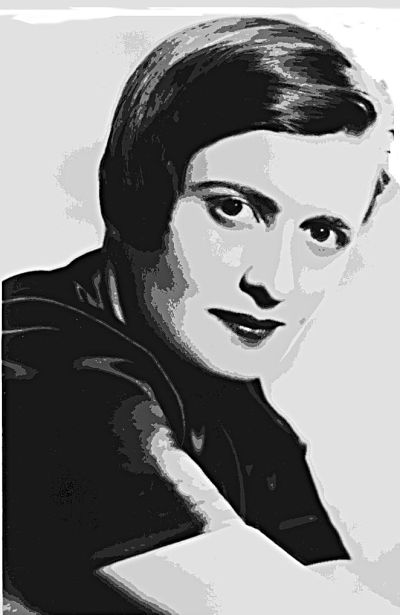I am told that Ayn Ra nd did not like CS Lewis.
nd did not like CS Lewis.
Yet having read Fountainhead over this Saturday*, I am convinced she should have given him more credit than she did. Her Fountainhead shares a theme with his That Hideous Strength.
She loathes the “secondhander” … the man who loses his self by giving up self for the approval of other people. She sets up her hero, Howard Roark, as a man who lives selfishly. He lives for his own desires in pursuit of greatness in architecture. This greatness justifies almost any deed and Rand shows that society is (often) appalled by his brutal pursuit of excellence.
Like Homer, Rand believes that human excellence is virtue. Roark is a winner, a builder who means to go on winning and friendships are formed with those who can help him on his way.
Contrasting with Roark is Peter Keaton, the saddest sack of failure this side of That Hideous Strength. Keaton never does anything he wants. First he gives up art to become an architect at the bidding of his controlling mother (who lives only for him). Keaton thrives by being a Babbitt. He does not challenge the system, he ingratiates himself with the powerful. He gets all his energy and affirmation from other people. If Keaton is not being praised, then he is insecure and realizes his own mediocrity. Yet Keaton knows he is mediocre, so he can never be happy.
Roark is happy.
We should all loath the Peter Keaton spirit . . . the tendency to settle or to set our standards based on false desires. I have known leaders who destroyed their own values in order to achieve “great things for God.” If you don’t recognize yourself at the end of a ministry, then you aren’t serving God, but the desires of other people.
CS Lewis has a better written “Peter Keaton” in his character Mark Studdock in That Hideous Strength. Mark is a “spaniel” who never reads what he wishes, has the friends he really wants, or the job he loves, because he is always striving for the “inner ring.” Mark wants approval and he too ends up miserable just like Peter Keaton.
Rand and Lewis both hate “secondhander” living and when two such folk agree the rest of us should pay attention. Nobody should live as a secondhander. Lewis describes this desire for approval as a lust for the “inner ring.”
My mom confronted me at one point in junior high as I began to drift from what I liked to what the “cool kids” liked. My life was being driven by (dreaded youth group term!) peer pressure and not my sense of self. Mom was right: I needed to be myself.
Ayn Rand advocates selfishness and as an evangelist for atheism (“believe in nothing but yourself and you will be saved”), she was hostile to Christianity. She saw Christian faith as a tool that some secondhanders used to convince other secondhanders to live inauthentic lives.
If this were true, then Christianity would be wicked.
Christianity wishes a human being to be who God created that human to be. God wishes a man or woman to be the self that God created and nothing else.
Of course, Rand does not think God exists. This is factually wrong. God does exist as Creator and Redeemer. Rand is not wrong to reject being a secondhander (even to religious groups!), but she is wrong about reality.
This is never a good thing.
God does wish us to submit our wills to His will. This is, however, because He is perfectly good, beautiful, and our creator. As our designer, God wishes each one of us to be the person He made.
Rand hates to see a human grovel and she is right. No man should grovel to another man, but there is only glory in “groveling” to God. God is all power, all goodness, and all love. He wants to restore us to ourselves.
The problem with Rand is that she has no way to define “excellence.” She sees a mountain and can only see ore to build skyscrapers. Skyscrapers are good . . . and achievement should be celebrated, but skyscrapers are not all good. The demands they make on the environment, for example, might be too great. Man is an imperfect creator.
This is not a call to make men subject to the will of other men. That is Lewis’ point in That Hideous Strength. Men speak for God who have no right to do so. God sets us free.
God help me, but I reject being a secondhander. I want to be “myself.” Yet (as Rand would agree), I would want to be the self I should be and not merely what I am. My desires now are an uncertain guide to what I really want and need. As a result, God reveals Himself to me and to His church. I submit to Him . . . never (ultimately) to any human being.
The trouble is that I should not be Mark Studdock (Peter Keaton) or Howard Roark. He makes a different mistakes from the secondhander. He is too small because he has forsaken reality by denying that God exists and failing to account for Him.
As a result, he misses the ineffable in his pursuit of excellence. He could be himself and be humble, because God is not a man. God wishes what should be and has eternity to produce it. Rand is trying for Utopia now.
Rand failed as Roark would have failed in reality. Don’t be a secondhander, but do not forget God.
__________________________
*I am thankful to Hunter Baker (who should be in Congress if the voters of Tennessee are wise) for reminding me to appreciate what is good about Rand before attacking her.











